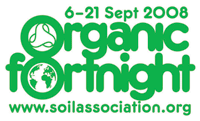It’s a well documented fact that food prices have been soaring in recent months. Latest news is that the price of pork sausages has risen by 40 per cent in the past year, and the price of bacon has almost doubled. Food inflation has been running at beyond double the general rate of inflation for the past 12 months.
Some people have claimed this has led to a drop in demand for organic food, as hard hit consumers rush from Waitrose to Lidl and Morrisons in a bid to reduce their food bills. Nevertheless, there are plenty of farmers out there who are passionate about producing food in the organic way, and have no plans to change to conventional food production to pay the bills.
Many of these will be involved in some way with Soil Association’s Organic food fortnight which kicks off on 6th and 7th September in Bristol with the biggest organic food festival in Europe.
Perhaps such commitment from the producers of organic food should cause us cash strapped consumers to stop for a moment and consider what we are really doing when it is our food bills we first seek to cut when the going gets tough. Clearly being economically sensible is a priority for many of us in the ongoing credit crunch, but is food the bill to be slashing first? Given that organic food is often better for your health, can come with minimum packing, (good for the environment) and often requires some preparation resulting in a fresh nutritious dish over and above a processed one, (a good thing given that obesity in Britain is reaching epidemic proportions), there are clear benefits to be had.
Two thoughts arise from the above. First, does organic have to cost more, or is it possible with savvy shopping via the internet and the farmers market rather than high end organic outlets, to still eat well for less? And second, what bills could we be seeking to cut before food? All suggestions welcome.
